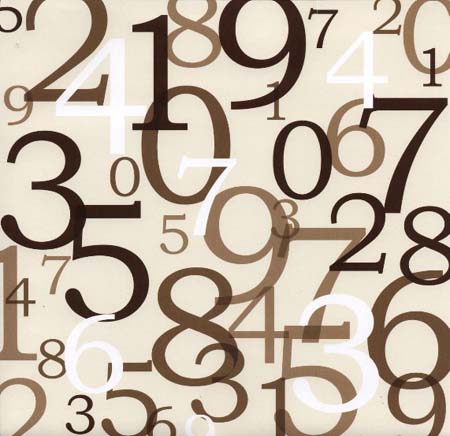Counting in French is something that must become second nature to any French language learner. Think about it… from telling someone your phone number to telling time or hearing how much something costs, we use numbers on a daily basis; numbers are essential not only to the beginning French learner but to learners at every level beyond that. It’s hard to go a day without hearing or saying a number. In addition, counting in French can be the difference between looking good in French or not. This article will go over EVERYTHING, essentially how to count to infinity (if you ever really wanted to).
Provided below is the number, the French spelling, and the French pronunciation. After the presentation of all the words, there are some exercises provided to test your knowledge! If you need help with the pronunciation, head on over to www.wordreference.com and simply type in the number. Word Reference offers an audio file right next to the bold word at the top. You can also look on Youtube for videos of French people pronouncing the numbers. You want to start off pronouncing things correctly from the beginning, otherwise it’s harder to fix your mistakes later down the line.
Counting in French
1 Un (uhn)
2 Deux (deuh)
3 Trois (twa)
4 Quatre (kat[r])
5 Cinq (sank)
6 Six (sees)
7 Sept (set)
8 Huit (wheat)
9 Neuf (nuhf)
10 Dix (deece)
11 Onze (onze)
12 Douze (doo-ze)
13 Treize (trez)
14 Quatorze (ka-torz)
15 Quinze (kanz)
16 Seize (sez)
17 Dix-sept (dees set)
18 Dix-huit (dees wheat)
19 Dix-neuf (dees nuhf)
20 Vingt (van)
21 Vingt-et-un (van tay uhn)
22 Vingt-deux (vant deuh)
23 vingt-trois (vant twa)
24 Vingt-quatre (vant kat)
25 Vingt-cinq (vant sank)
26 Vingt-six (vant sees)
27 Vingt-sept (vant set)
28 Vingt-huit (vant wheat)
29 Vingt-neuf (vant nuhf)
Pronunciation tip for “Vingt” is to think of the English word “want” and then replace the “w” with a /v/ consonant. If you’ve ever heard German people pronounce their “w’s” like “v’s” then this example has a similar connotation.
30 Trente (tront)
31 Trente-et-un (tron tay uhn)
32 Trente-deux (tront deux)
To count from 31-39, simply use the word “Trente” (30) and add on the number from 2-9 to get the number you want. It’s exactly like in English if I said “thirty-four”.
40 Quarante (caront)
41 Quarante-et-un (caron tay uhn)
To count from 42-49, simply use the word “Quarante” (40) and add on the number from 2-9 to get the number you want. It’s exactly like in English if I said “forty-four”.
50 Cinquante (sankonte)
51 Cinquante-et-un (sankon tay uhn)
52 Cinquante-deux (sankonte deuh)
60 Soixante (swa-cent)
61 Soixante-et-un (swa-cen tay uhn)
62 Soixante-deux (swa-cent deuh)
To count from 70-79, use the word “Soixante” (60) and add on the numbers from 10-19 to get the number you want. If I wanted the number 73, then I say “soixante-treize”, literally, 60-13 (which equals 73).
70 Soixante-dix (swa-cent deece)
71 Soixante-onze (swa-cent onze)
72 Soixante-douze(swa-cent doo-ze)
73 Soixante-treize(swa-cent trez)
74 Soixante-quatroze (swa-cent ka-torz)
75 Soixante-quinze (swa-cent kanz)
76 Soixante-seize (swa-cent sez)
77 Soixante-dix-sept (swa-cent dees-set)
78 Soixante-dix-huit (swa-cent dees-wheat)
79 Soicante-dix-neuf (swa-cent dees-nuhf)
To count from 80-89, use the word “Quatre-vingts” (literally four 20’s which multiplies to give you 80) and add on a number between 1-9. You can kind of see why French Learners don’t like numbers this high up… it’s a little more taxing to produce them. Note that the [r] consonant below kind of sounds like a “ruh” sound and the “r” is subtly rolled – very hard for beginners to pick up.
80 Quatre-vingts (kat[r] van)
81 Quatre-vingt-un (kat[r] vant uhn)
82 Quatre-vingt-deux (kat[r] vant deuh)
83 Quatre-vingt-trois (kat[r] van-twa)
84 Quatre-vingt-quatre (kat[r] vankat)
85 Quatre-vingt-cinq (kat[r] vint-sank)
86 Quatre-vingt-six (kat[r] vint-sees)
87 Quatre-vingt-sept (kat[r] vint-set)
88 Quatre-vingt-huit (kat[r] vint-wheat)
89 Quatre-vingt-neuf (kat[r] vint-nuhf)
90 Quatre-vingt-dix
91 Quatre-vingt-onze
92 Quatre-vingt-douze
93 Quatre-vingt-treize
94 Quatre-vingt-quatorze
95 Quatre-vingt-quinze
96 Quatre-vingt-seize
97 Quatre-vingt-dix-sept
98 Quatre-vingt-dix-huit
99 Quatre-vingt-dix-neuf
100 Cent (sant)
101 Cent un (san tun)
102 Cent deux (san deuh)
103 Cent trois (san twa)
200 Deux Cents (deuh sant)
573 Cinq Cents Soixante-Treize
829 Huit Cents Vingt-Neuf
The word “Cent” takes an “s” when it is plural, a.k.a more than one-hundred.
1000 Mille (meel)
1250 Mille Deux Cents Cinquante (OR) Douze Cents Cinquante
2012 Deux Mille Douze (current year)
1,000,000 Million
1,000,000,000 Milliard (English equivalent of a billion)
1,000,000,000,000 Billion (English equivalent of a trillion)
1,000,000,000,000,000 Billiard (English equivalent of a quadrillion)
1,000,000,000,000,000,000 Trillion (English Equivalent of a quintillion)
Count in French Exercises
Write out and say the following numbers:
1. 9
2. 78
3. 47
4. 25
5. 86
6. 94
7. 62
8. 333
9. 1651
10. 4980
11. Mille
12. Deux cent treize
13. Quatre-vingt-quatorze
14. Deux cents quatre-vingt-quinze
15. Milliard
16. Onze
17. Quarante-et-un
18. Sept cents soixante-deux
19. Trois mille six
20. Six mille six cents soixante-six
Answers:
1. neuf, 2. soixante-dix-huit, 3. quarante-sept, 4. vingt-cinq, 5. quatre-vingt-six, 6. quatre-vingt-quatroze, 7. soixante-deux, 8. trois cents trente trois, 9. mille six cents cinquante-et-un OR quinze cents cinquante-et-un, 10. quatre mille neuf cents quatre-vingts
11. 1,000 12. 213 13. 94 14. 295 15. 1,000,000,000 16. 11 17. 41 18. 762 19. 3,006 20. 6,666




12. Deux cent treize
18. Sept cents soixante-deux
Why do you not have an s after cent in #12?
I’m looking for the definitive rule about when to use the s for numbers over 199.
It’s actually supposed to be sept cent soixant-deux.
The rule is that you would add an “s” to cent whenever there is no numerical adjective which follows:
quatre cents personnes
quatre cent trois mille personnes
If you wanna read more about this:
https://www.projet-voltaire.fr/regles-orthographe/cent-ou-cents/
But if you’re in the French speaking part of Belgium, 70 is septante and 90 is nonante. Some parts use octante for 80. And then there’s parts of Switzerland that use septante, huitante, and nonante.
Hello, thanks for the comment. I purposely did not include those numbers up above. I love Belgium and Switzerland (I have many French speaking friends from there) but I don’t want to confuse any beginners. Maybe if a lot more people begin to get “concerned” about this, I’ll write something up above.